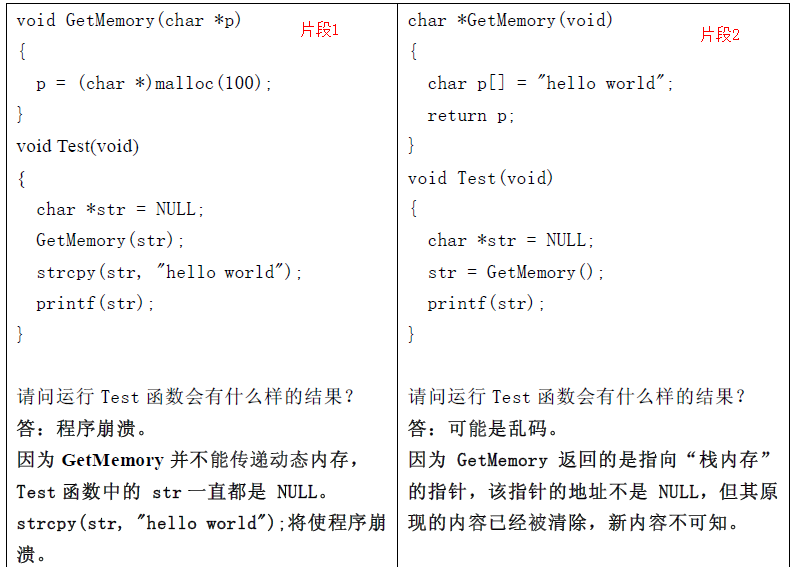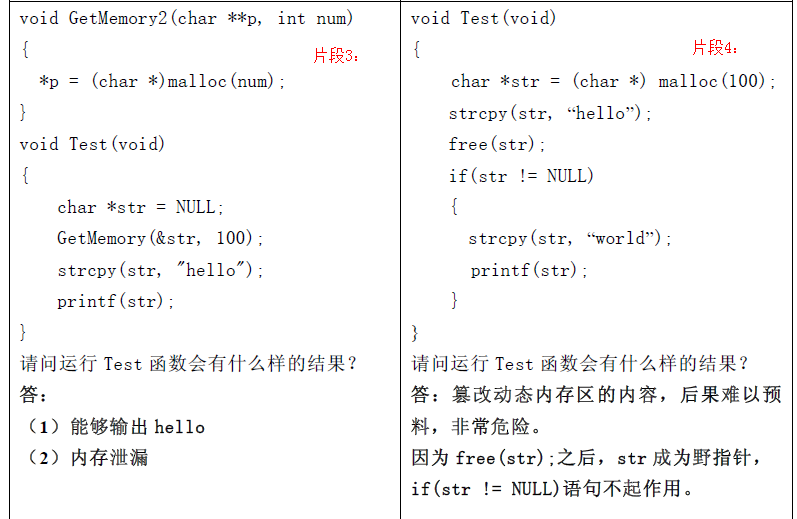内存的思考
片段1修改方法有三种:
方法一:可以在GetMemory函数中加上一个返回开辟空间的指针,通过它再对Test函数中的str指针重新赋值,可以解决这个问题。
方法二:由于Test中的str指针指向空,无法将指向空间的有效地址传递给GetMemory的形参,因此只需在Test函数中str指针指向一个非空的空间(不管空间大小多大),同样可以达到解决的效果。
方法三:就是下面的片段3
在C++ 程序中调用被C 编译器编译后的函数,为什么要加extern “C”?
C++语言支持函数重载,C 语言不支持函数重载。函数被C++编译后在库中的名字与C 语言的不同。假设某个函数的原型为: void foo(int x, int y);该函数被C 编译器编译后在库中的名字为_foo,而C++编译器则会产生像_foo_int_int 之类的名字。C++提供了C 连接交换指定符号extern“C”来解决名字匹配问题。
编写strcpy 函数
char* strcpy(char* strDesc, const char* strSrc)
{
assert( (strDesc!=NULL) && (strSrc!=NULL) ); // 确保二者有空间
char* address = strDesc;
while ( (*strDesc++=*strSrc++)!='\0' );
return address;
}strcpy的返回值的作用:为了实现链式表达式。
编写类String 的构造函数、析构函数和赋值函数
class String
{
public:
String(const char* str = NULL); //普通构造函数
String(const String& other); //拷贝构造函数
~String(void); //析构函数
String& operator=(const String& other); //赋值函数
private:
char* m_data;
};
String::String(const char* str /* = NULL */)
{
if(str==NULL)
{
m_data = new char[1];
*m_data = '\0';
}
else
{
int length = strlen(str);
m_data = new char[length+1];
strcpy(m_data,str);
}
}
String::String(const String &other)
{
int length = strlen(other.m_data);
m_data = new char[length+1];
strcpy(m_data,other.m_data);
}
String::~String(void)
{
delete[] m_data;
}
String& String::operator=(const String& other)
{
//检查自赋值
if( this == &other )
return *this;
//释放原有内存资源
delete[] m_data;
//分配新的内存资源,并复制内容
int length = strlen(other.m_data);
m_data = new char[length+1];
strcpy(m_data,other.m_data);
//返回本对象的引用
return *this;
}
参考:来着林锐C/C++高质量编程
























 1164
1164











 被折叠的 条评论
为什么被折叠?
被折叠的 条评论
为什么被折叠?








